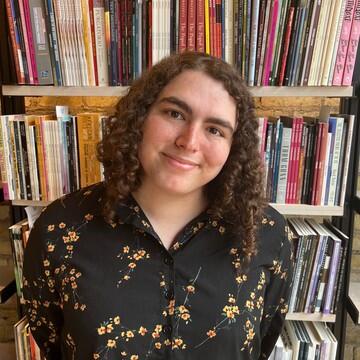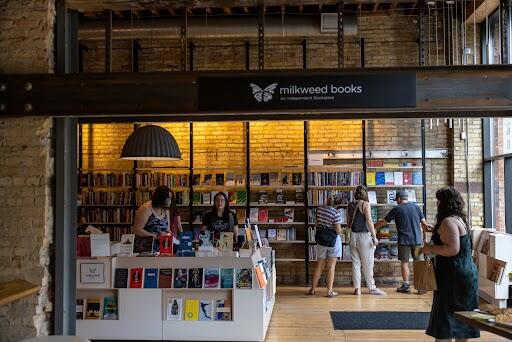Milkweed Books celebrates a year since reopening
This August, we’re proud to celebrate the one-year reopening anniversary of our brick-and-mortar bookstore, Milkweed Books! Originally established in 2016 at the nation’s largest literary center, Open Book, Milkweed Books is the realization of a long-held dream to deepen our connection to community, and to introduce readers to transformative books and authors that align with our mission and values. Despite closure in 2020, we were thrilled to reinstate our beloved public space in the summer of 2022. We continue to enrich our neighborhood with a vital, newly reimagined community asset that connects people with stories through book sales, exciting literary events, and more. Learn more about our store’s inspiring revival, in this brief spotlight interview with Milkweed Books’ Bookstore Manager, Natalie Marlin.
*

Natalie Marlin got her start in bookselling through a part-time gig with Harvard Book Store only a year or so after she moved to Boston in 2016. Her role would later evolve into a full-time position, working as a bookseller, events assistant, and print-on-demand assistant for the duration of four years. On a bright, sunny day this week on the Open Book patio, she shared some of the lessons and experience gained from her time there, which prepared her to take the helm at our independent bookstore. She also spoke about her biggest joys as a bookseller at Milkweed Books, and the bookstore’s biggest challenges and opportunities for the years to come.
Milkweed Staff (MS): You started out as the first and only employee of Milkweed Books back in June of last year. What was the immediate task at hand for you when you were hired?
Natalie Marlin (NM): When I came on in June of last year, first on the docket for us was to get the store back in shape, revitalize our stock and inventory practices, and re-imagine the layout of our store over the first two months of summer. And then we’d have a big launch in August where we’d firmly announce to the public: we’re back. From there, the focus transitioned to: what opportunities can this provide for our local readers and authors? How do we re-establish our connections with the surrounding community?
MS: How does your experience reopening Milkweed Books from the ground up compare to your previous experience at Harvard Book Store?
NM: Harvard Book Store is known for its robust events programming, with readings booked out virtually every weeknight during their busier months. Everything I did in the earlier part of my time there was either related to the setup of sales events and stock management. It wasn’t until the following year that I got more involved with bookselling directly, where another bookseller there was moving into a more administrative role right before the holiday season. There was a sizable gap to fill for someone who could be trained quickly to take over that role and it made sense for me to be the one to transition into that full time. It was a great crash course for me to be able to handle anything and everything. It was demanding and chaotic at times, but it really taught me how to think about operating efficiently in a fast-paced environment, which has definitely come in handy since transitioning to a space with a sizably smaller staff, where it’s essential to know the ins and outs of virtually every part of our store’s operations.
MS: What’s one key takeaway you’ve emerged with since our bookstore officially reopened a year ago?
NM: Initially, we weren’t sure what to expect in terms of community reception after two years of being closed. The reopening celebration was our first big moment to assess and meet general demand, and far and away we had our best sales of the year on that day. That alone proved the bookstore’s potential.
Most people who are enthusiastic about indie bookstores don’t need an incentive to come out beyond a specially designated day that gives them the excuse to celebrate something they’re passionate about—giving thanks to the people who keep important community spaces like ours alive. It creates some of the most impassioned turn out, beyond any single sales promotion or author event.
MS: What are the biggest challenges and opportunities you foresee for Milkweed Books in the near future?
NM: Our biggest challenge right now is assessing long-term sustainability. We want to make room for as many event requests as we can, which is a great problem to have because it’s made clear that the demand for a space like ours is ever-growing, but I’m looking toward how we’ll be able to accommodate more people in the future while still working to deliver every event as a singular experience in itself.
In a similar vein, our biggest opportunity right now is to be conscious about what voices and whose platforms we involve and elevate through author readings and events. So much of our fall slate involves our Milkweed Presents series, featuring both established and emerging authors. We also have a faculty-student reading series that presents an entry-level opportunity for folx. From a personal standpoint, I’m really excited about the fact that a good portion of our fall events are intentionally spotlighting marginalized authors. I make it a priority: we have these opportunities to use our space equitably, so why not do it?
We’re also still assessing what we can continue to be, and what we can still become in the years ahead. I’m interested in providing more opportunities of connection to a larger sample of the community, and I’m interested in more closely assessing our buying and curation practices, and examining how they reflect on our character as an independent bookstore and publisher of the public sphere.
